Business Ethics: Annual Ethics Training for New Employees Report
VerifiedAdded on 2022/11/25
|5
|903
|156
Report
AI Summary
This report delves into the critical aspects of business ethics, examining the employer-employee relationship beyond a purely economic perspective. It outlines employee rights, including a safe and healthy workplace, and the employer's ethical responsibilities. The report highlights potential ethical dilemmas, such as the misuse of company resources and conflicting job offers, and applies ethical theories like utilitarianism and relativism to analyze these situations. It provides a framework for ethical decision-making, emphasizing the importance of considering both personal interests and moral obligations. Furthermore, the report addresses common ethical dilemmas employees face, like job offers and taking credit for others' work. The report concludes by referencing the importance of ethical principles in the business environment and the need for ethical training programs to guide new employees in ethical decision making.
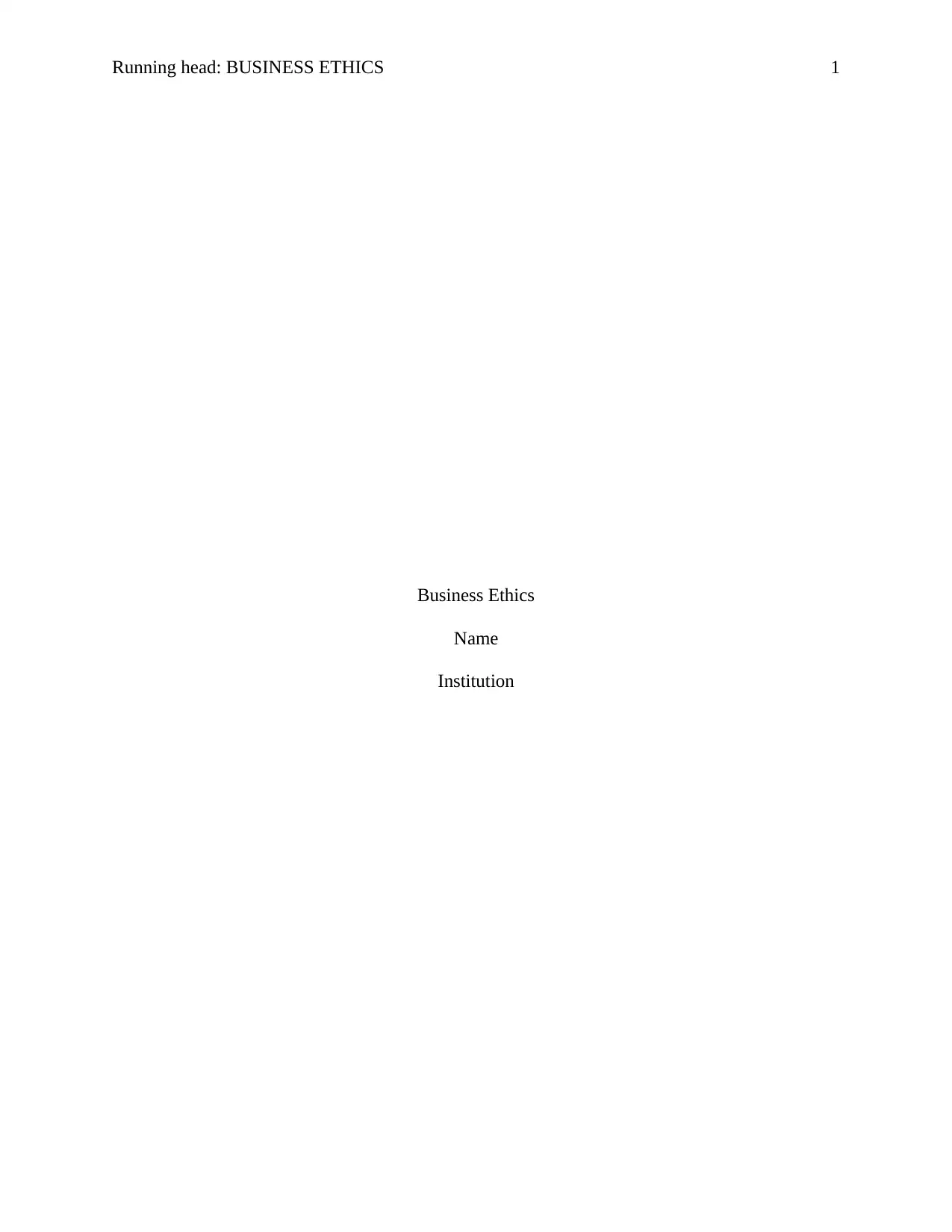
Running head: BUSINESS ETHICS 1
Business Ethics
Name
Institution
Business Ethics
Name
Institution
Paraphrase This Document
Need a fresh take? Get an instant paraphrase of this document with our AI Paraphraser
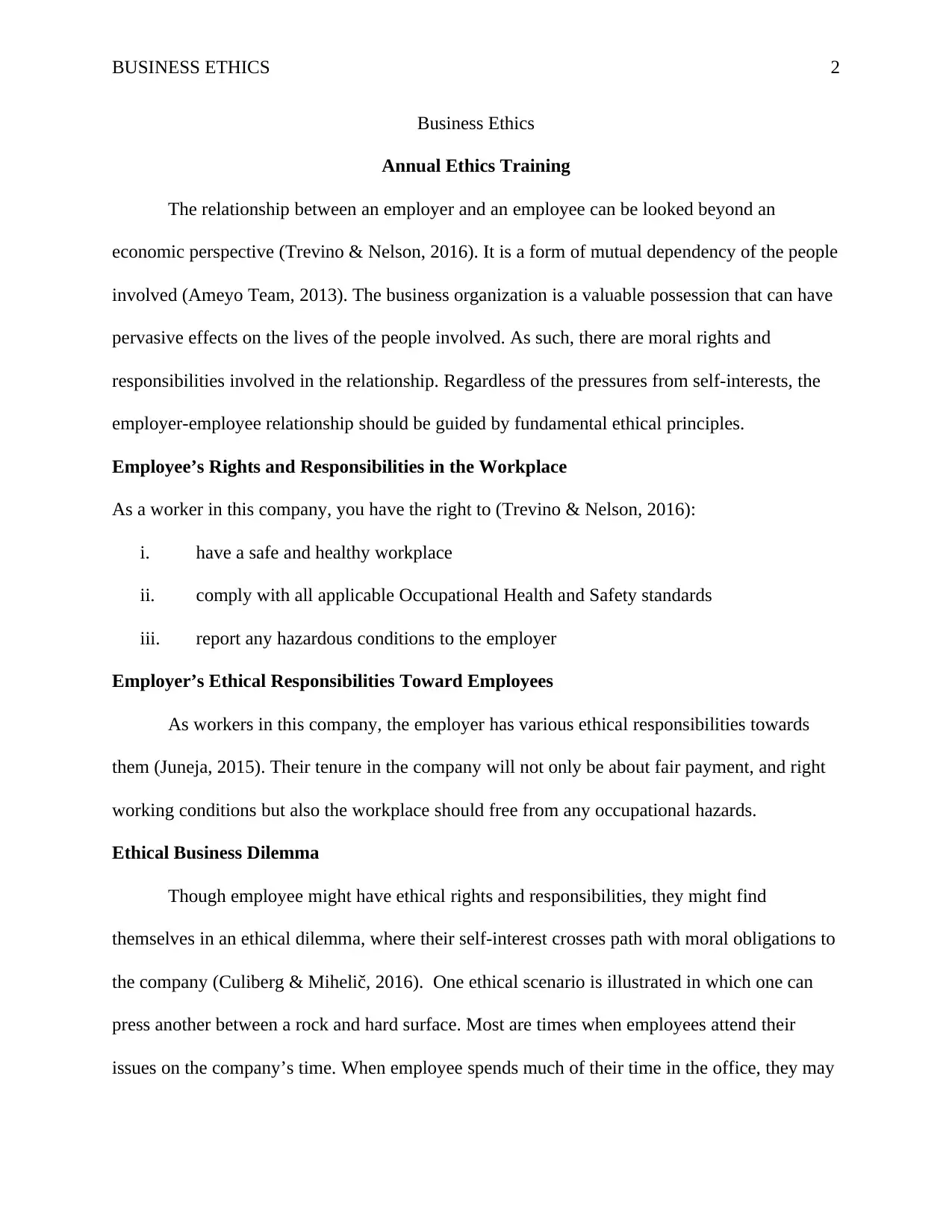
BUSINESS ETHICS 2
Business Ethics
Annual Ethics Training
The relationship between an employer and an employee can be looked beyond an
economic perspective (Trevino & Nelson, 2016). It is a form of mutual dependency of the people
involved (Ameyo Team, 2013). The business organization is a valuable possession that can have
pervasive effects on the lives of the people involved. As such, there are moral rights and
responsibilities involved in the relationship. Regardless of the pressures from self-interests, the
employer-employee relationship should be guided by fundamental ethical principles.
Employee’s Rights and Responsibilities in the Workplace
As a worker in this company, you have the right to (Trevino & Nelson, 2016):
i. have a safe and healthy workplace
ii. comply with all applicable Occupational Health and Safety standards
iii. report any hazardous conditions to the employer
Employer’s Ethical Responsibilities Toward Employees
As workers in this company, the employer has various ethical responsibilities towards
them (Juneja, 2015). Their tenure in the company will not only be about fair payment, and right
working conditions but also the workplace should free from any occupational hazards.
Ethical Business Dilemma
Though employee might have ethical rights and responsibilities, they might find
themselves in an ethical dilemma, where their self-interest crosses path with moral obligations to
the company (Culiberg & Mihelič, 2016). One ethical scenario is illustrated in which one can
press another between a rock and hard surface. Most are times when employees attend their
issues on the company’s time. When employee spends much of their time in the office, they may
Business Ethics
Annual Ethics Training
The relationship between an employer and an employee can be looked beyond an
economic perspective (Trevino & Nelson, 2016). It is a form of mutual dependency of the people
involved (Ameyo Team, 2013). The business organization is a valuable possession that can have
pervasive effects on the lives of the people involved. As such, there are moral rights and
responsibilities involved in the relationship. Regardless of the pressures from self-interests, the
employer-employee relationship should be guided by fundamental ethical principles.
Employee’s Rights and Responsibilities in the Workplace
As a worker in this company, you have the right to (Trevino & Nelson, 2016):
i. have a safe and healthy workplace
ii. comply with all applicable Occupational Health and Safety standards
iii. report any hazardous conditions to the employer
Employer’s Ethical Responsibilities Toward Employees
As workers in this company, the employer has various ethical responsibilities towards
them (Juneja, 2015). Their tenure in the company will not only be about fair payment, and right
working conditions but also the workplace should free from any occupational hazards.
Ethical Business Dilemma
Though employee might have ethical rights and responsibilities, they might find
themselves in an ethical dilemma, where their self-interest crosses path with moral obligations to
the company (Culiberg & Mihelič, 2016). One ethical scenario is illustrated in which one can
press another between a rock and hard surface. Most are times when employees attend their
issues on the company’s time. When employee spends much of their time in the office, they may
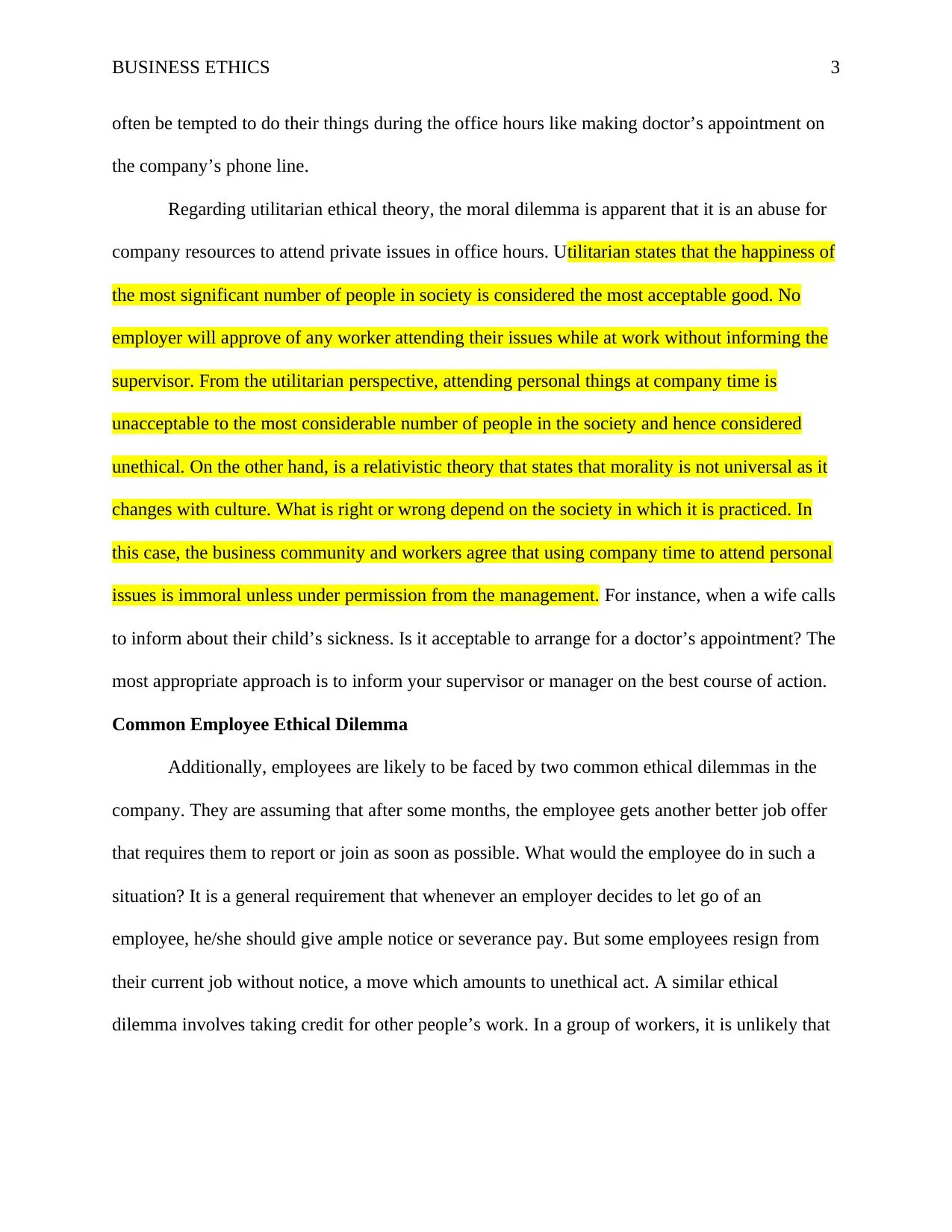
BUSINESS ETHICS 3
often be tempted to do their things during the office hours like making doctor’s appointment on
the company’s phone line.
Regarding utilitarian ethical theory, the moral dilemma is apparent that it is an abuse for
company resources to attend private issues in office hours. Utilitarian states that the happiness of
the most significant number of people in society is considered the most acceptable good. No
employer will approve of any worker attending their issues while at work without informing the
supervisor. From the utilitarian perspective, attending personal things at company time is
unacceptable to the most considerable number of people in the society and hence considered
unethical. On the other hand, is a relativistic theory that states that morality is not universal as it
changes with culture. What is right or wrong depend on the society in which it is practiced. In
this case, the business community and workers agree that using company time to attend personal
issues is immoral unless under permission from the management. For instance, when a wife calls
to inform about their child’s sickness. Is it acceptable to arrange for a doctor’s appointment? The
most appropriate approach is to inform your supervisor or manager on the best course of action.
Common Employee Ethical Dilemma
Additionally, employees are likely to be faced by two common ethical dilemmas in the
company. They are assuming that after some months, the employee gets another better job offer
that requires them to report or join as soon as possible. What would the employee do in such a
situation? It is a general requirement that whenever an employer decides to let go of an
employee, he/she should give ample notice or severance pay. But some employees resign from
their current job without notice, a move which amounts to unethical act. A similar ethical
dilemma involves taking credit for other people’s work. In a group of workers, it is unlikely that
often be tempted to do their things during the office hours like making doctor’s appointment on
the company’s phone line.
Regarding utilitarian ethical theory, the moral dilemma is apparent that it is an abuse for
company resources to attend private issues in office hours. Utilitarian states that the happiness of
the most significant number of people in society is considered the most acceptable good. No
employer will approve of any worker attending their issues while at work without informing the
supervisor. From the utilitarian perspective, attending personal things at company time is
unacceptable to the most considerable number of people in the society and hence considered
unethical. On the other hand, is a relativistic theory that states that morality is not universal as it
changes with culture. What is right or wrong depend on the society in which it is practiced. In
this case, the business community and workers agree that using company time to attend personal
issues is immoral unless under permission from the management. For instance, when a wife calls
to inform about their child’s sickness. Is it acceptable to arrange for a doctor’s appointment? The
most appropriate approach is to inform your supervisor or manager on the best course of action.
Common Employee Ethical Dilemma
Additionally, employees are likely to be faced by two common ethical dilemmas in the
company. They are assuming that after some months, the employee gets another better job offer
that requires them to report or join as soon as possible. What would the employee do in such a
situation? It is a general requirement that whenever an employer decides to let go of an
employee, he/she should give ample notice or severance pay. But some employees resign from
their current job without notice, a move which amounts to unethical act. A similar ethical
dilemma involves taking credit for other people’s work. In a group of workers, it is unlikely that
⊘ This is a preview!⊘
Do you want full access?
Subscribe today to unlock all pages.

Trusted by 1+ million students worldwide
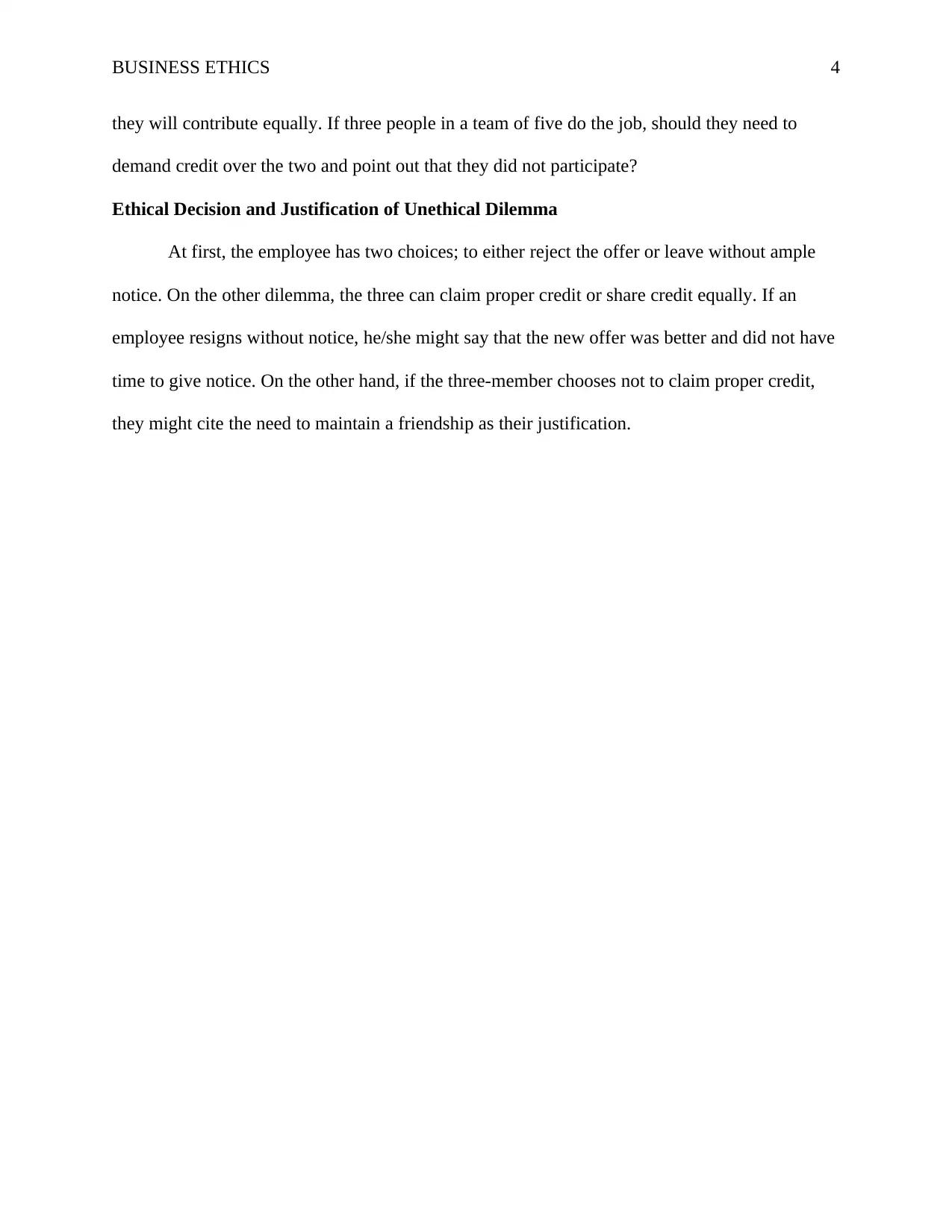
BUSINESS ETHICS 4
they will contribute equally. If three people in a team of five do the job, should they need to
demand credit over the two and point out that they did not participate?
Ethical Decision and Justification of Unethical Dilemma
At first, the employee has two choices; to either reject the offer or leave without ample
notice. On the other dilemma, the three can claim proper credit or share credit equally. If an
employee resigns without notice, he/she might say that the new offer was better and did not have
time to give notice. On the other hand, if the three-member chooses not to claim proper credit,
they might cite the need to maintain a friendship as their justification.
they will contribute equally. If three people in a team of five do the job, should they need to
demand credit over the two and point out that they did not participate?
Ethical Decision and Justification of Unethical Dilemma
At first, the employee has two choices; to either reject the offer or leave without ample
notice. On the other dilemma, the three can claim proper credit or share credit equally. If an
employee resigns without notice, he/she might say that the new offer was better and did not have
time to give notice. On the other hand, if the three-member chooses not to claim proper credit,
they might cite the need to maintain a friendship as their justification.
Paraphrase This Document
Need a fresh take? Get an instant paraphrase of this document with our AI Paraphraser
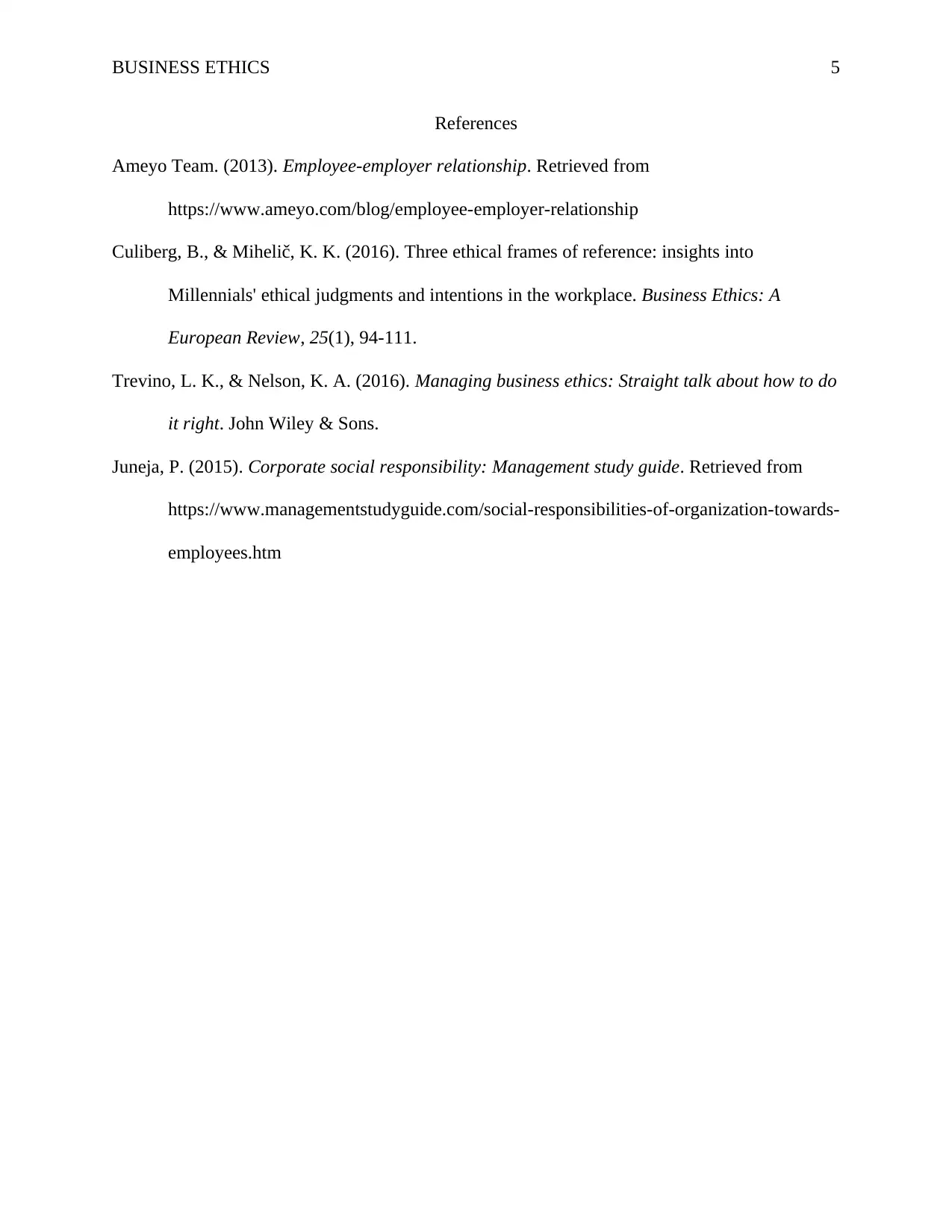
BUSINESS ETHICS 5
References
Ameyo Team. (2013). Employee-employer relationship. Retrieved from
https://www.ameyo.com/blog/employee-employer-relationship
Culiberg, B., & Mihelič, K. K. (2016). Three ethical frames of reference: insights into
Millennials' ethical judgments and intentions in the workplace. Business Ethics: A
European Review, 25(1), 94-111.
Trevino, L. K., & Nelson, K. A. (2016). Managing business ethics: Straight talk about how to do
it right. John Wiley & Sons.
Juneja, P. (2015). Corporate social responsibility: Management study guide. Retrieved from
https://www.managementstudyguide.com/social-responsibilities-of-organization-towards-
employees.htm
References
Ameyo Team. (2013). Employee-employer relationship. Retrieved from
https://www.ameyo.com/blog/employee-employer-relationship
Culiberg, B., & Mihelič, K. K. (2016). Three ethical frames of reference: insights into
Millennials' ethical judgments and intentions in the workplace. Business Ethics: A
European Review, 25(1), 94-111.
Trevino, L. K., & Nelson, K. A. (2016). Managing business ethics: Straight talk about how to do
it right. John Wiley & Sons.
Juneja, P. (2015). Corporate social responsibility: Management study guide. Retrieved from
https://www.managementstudyguide.com/social-responsibilities-of-organization-towards-
employees.htm
1 out of 5
Related Documents
Your All-in-One AI-Powered Toolkit for Academic Success.
+13062052269
info@desklib.com
Available 24*7 on WhatsApp / Email
![[object Object]](/_next/static/media/star-bottom.7253800d.svg)
Unlock your academic potential
Copyright © 2020–2026 A2Z Services. All Rights Reserved. Developed and managed by ZUCOL.




